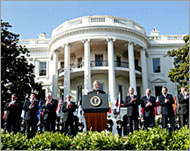Syrians feel bite of sanctions
Three weeks after Washington imposed economic sanctions on Syria, local business people are beginning to assess the negative impact on their activities.

On 11 May when the United States imposed sanctions – for what it termed Syria’s “support for terrorism”, which Damascus denies – the authorities in Syria sought to play down their likely repercussions.
But in the past few days, there has been a somewhat different stance. Syrian Trade and Economy Minister Ghassan Rifaai spoke openly about their “negative impact” on the economy.
He acknowledged the sanctions were not “a good sign at the moment when (the country) is moving towards an (economic)opening and to attract investment.”
“The announcement of sanctions battered us psychologically and will worsen the climate for investments, trade, industry and our financial transactions abroad,” one representative of an American firm in Syria told AFP.
Meeting
The US embassy in Damascus on 21 May invited 150 Syrian business people to attend a briefing explaining the details of the measures which ban the import of American products other than food and medicines and freeze the assets of the Commercial Bank of Syria, the main state bank, in the United States.
 |
|
Washington accuses Syria of |
The meeting appeared to bring home to the business people the seriousness of the US step.
“I fear that I’m going to lose out and suffer delays because we import technology and equipment from the United States,” said one importer.
According to US embassy figures, Syrian-US trade totalled $473 million in 2003, of which $214 million were US exports, particularly food products.
The same importer said that the figures were misleading. “The trade is in fact more important because some orders are (deliberately) marked down on the bills.”
The agent of another US firm commented: “According to the US embassy, international companies which have American involvement above 10% are affected by the sanctions and can’t get round them, because neighbouring countries are banned from allowing the transit of prohibited products to Syria.”
He added: “I can’t bring equipment into Syria even though I ordered it before May 11, even via Cyprus.”
Alternative sources
Syrian Arab Airlines director general Nashat Nmair, whose company can conditionally continue to import spares for its Boeing aircraft, said the “firm’s dollar transactions around the world could be affected because they need endorsement from New York.”
|
“I fear that I’m going to lose out and suffer delays because we import technology and equipment from the United States” Syrian importer |
One former Syrian official said: “Syria may find alternative supply sources particularly in southeast Asia and Turkey, with which it is going to set up a free-trade zone.”
Another importer commented: “Private businessmen will avoid Europe – despite it being a privileged partner of Syria with which an association agreement is due to be signed – because the euro will cost them 20 to 25% more.”
A centralised state system has been in force in Syria since the beginning of the 1960s after massive nationalisation. Today however, according to Prime Minister Naji Utaria, the private sector accounts for 60% of the economy. But much remains to be done to modernise the system.